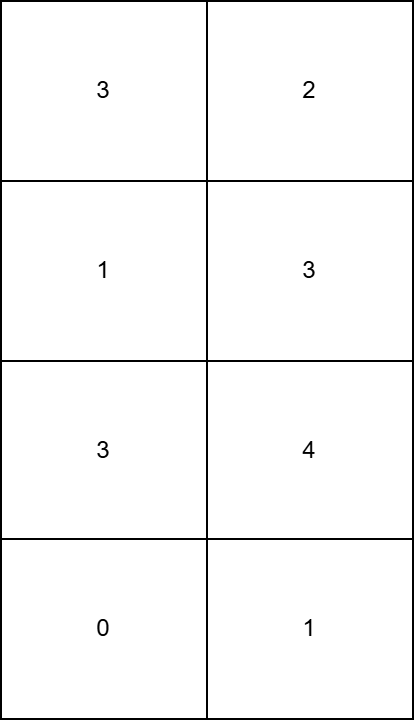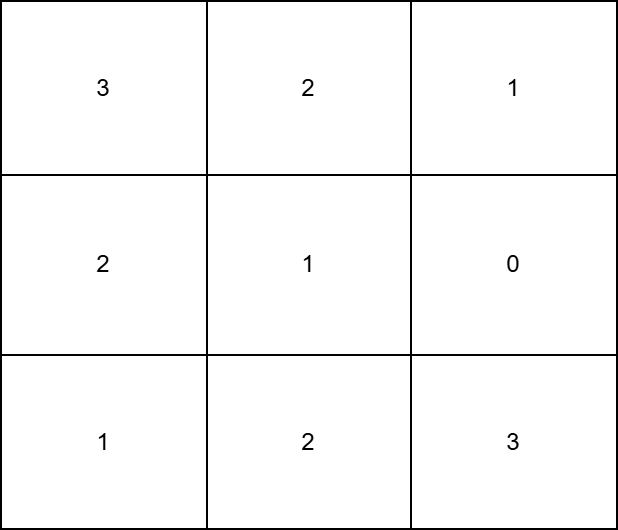| comments | difficulty | edit_url | tags | |||
|---|---|---|---|---|---|---|
true |
Easy |
|
You are given a m x n matrix grid consisting of non-negative integers.
In one operation, you can increment the value of any grid[i][j] by 1.
Return the minimum number of operations needed to make all columns of grid strictly increasing.
Example 1:
Input: grid = [[3,2],[1,3],[3,4],[0,1]]
Output: 15
Explanation:
- To make the
0thcolumn strictly increasing, we can apply 3 operations ongrid[1][0], 2 operations ongrid[2][0], and 6 operations ongrid[3][0]. - To make the
1stcolumn strictly increasing, we can apply 4 operations ongrid[3][1].

Example 2:
Input: grid = [[3,2,1],[2,1,0],[1,2,3]]
Output: 12
Explanation:
- To make the
0thcolumn strictly increasing, we can apply 2 operations ongrid[1][0], and 4 operations ongrid[2][0]. - To make the
1stcolumn strictly increasing, we can apply 2 operations ongrid[1][1], and 2 operations ongrid[2][1]. - To make the
2ndcolumn strictly increasing, we can apply 2 operations ongrid[1][2].

Constraints:
m == grid.lengthn == grid[i].length1 <= m, n <= 500 <= grid[i][j] < 2500
We can traverse the matrix column by column. For each column, we calculate the minimum number of operations required to make it strictly increasing. Specifically, for each column, we maintain a variable
The time complexity is
class Solution:
def minimumOperations(self, grid: List[List[int]]) -> int:
ans = 0
for col in zip(*grid):
pre = -1
for cur in col:
if pre < cur:
pre = cur
else:
pre += 1
ans += pre - cur
return ansclass Solution {
public int minimumOperations(int[][] grid) {
int m = grid.length, n = grid[0].length;
int ans = 0;
for (int j = 0; j < n; ++j) {
int pre = -1;
for (int i = 0; i < m; ++i) {
int cur = grid[i][j];
if (pre < cur) {
pre = cur;
} else {
++pre;
ans += pre - cur;
}
}
}
return ans;
}
}class Solution {
public:
int minimumOperations(vector<vector<int>>& grid) {
int m = grid.size(), n = grid[0].size();
int ans = 0;
for (int j = 0; j < n; ++j) {
int pre = -1;
for (int i = 0; i < m; ++i) {
int cur = grid[i][j];
if (pre < cur) {
pre = cur;
} else {
++pre;
ans += pre - cur;
}
}
}
return ans;
}
};func minimumOperations(grid [][]int) (ans int) {
m, n := len(grid), len(grid[0])
for j := 0; j < n; j++ {
pre := -1
for i := 0; i < m; i++ {
cur := grid[i][j]
if pre < cur {
pre = cur
} else {
pre++
ans += pre - cur
}
}
}
return
}function minimumOperations(grid: number[][]): number {
const [m, n] = [grid.length, grid[0].length];
let ans: number = 0;
for (let j = 0; j < n; ++j) {
let pre: number = -1;
for (let i = 0; i < m; ++i) {
const cur = grid[i][j];
if (pre < cur) {
pre = cur;
} else {
++pre;
ans += pre - cur;
}
}
}
return ans;
}